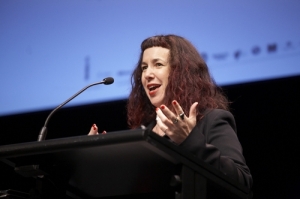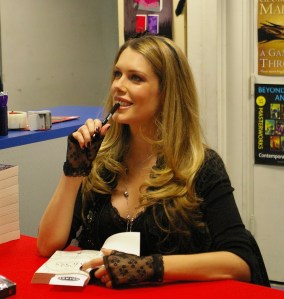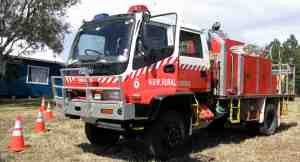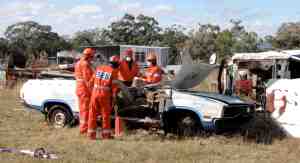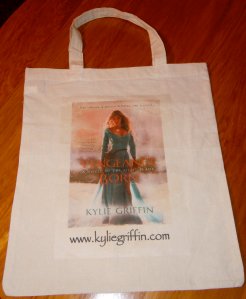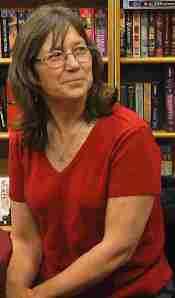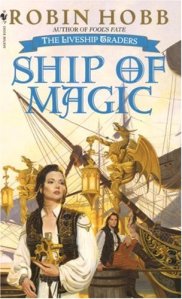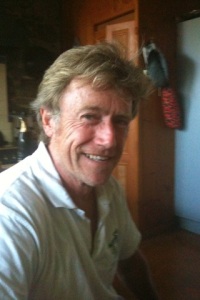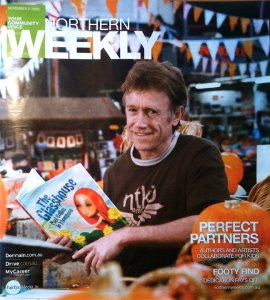As the next of my series featuring fantastic female fantasy authors (see disclaimer) I’ve invited the talented and incredibly popular (non-stop queues at Supanova) Isobelle Carmody to drop by.
 Q: Where to begin, Isobelle? You have four fantasy series, numerous stand alone novels, collections, short stories and picture books. You’ve been writing since you were fourteen, published since you were (19?). Your whole life seems to have revolved around writing. Not to disparage your writing achievements, but do you ever look back and think I wish I’d done veterinary science, or become an archaeologist?
Q: Where to begin, Isobelle? You have four fantasy series, numerous stand alone novels, collections, short stories and picture books. You’ve been writing since you were fourteen, published since you were (19?). Your whole life seems to have revolved around writing. Not to disparage your writing achievements, but do you ever look back and think I wish I’d done veterinary science, or become an archaeologist?
No, but I wish I had worked harder at school and learned to be something else as well. A doctor or something really practical so I could sometimes do something decisively about the things that trouble me in the world. I envy Ian Irvine his marine science back and Nick Earls his ability to heal. But in truth, I am pretty happy with what I have done with my life, because I do think writing matters. It certainly mattered to me – It built me – my mind and my imagination. It saved me…
Q: You live part of your time in Prague and part in a small township near Apollo Bay on the Great Ocean Road. I’ve never been to Prague, but I do know the Great Ocean Road. My husband’s family come from Warrnambool. This stretch of coast, known as the shipwreck coast, is stark and beautiful. Do you find the isolation and beauty help you to focus and write?
 Absolutely. Both are essential, and for me beauty is often found in starkness. I have always found really desolate places visually appealing – sandy deserts, arctic , industrial wastelands. I suspect I am attracted them because there is less or no sign of humanity- no people or shops or signs. I remember looking at a film if beautiful. Somehow I am very attracted to wastelands- dumpsites, nuclear drop zones like Chernobyl, end of the world scenarios with a touch of dystopia. The coast along the Great Ocean Road is beauty in its wild and savage and dangerous mode. And Prague is like a fairy tale with its cobbled twisty streets and buildings.
Absolutely. Both are essential, and for me beauty is often found in starkness. I have always found really desolate places visually appealing – sandy deserts, arctic , industrial wastelands. I suspect I am attracted them because there is less or no sign of humanity- no people or shops or signs. I remember looking at a film if beautiful. Somehow I am very attracted to wastelands- dumpsites, nuclear drop zones like Chernobyl, end of the world scenarios with a touch of dystopia. The coast along the Great Ocean Road is beauty in its wild and savage and dangerous mode. And Prague is like a fairy tale with its cobbled twisty streets and buildings.
 Q: You are married to a Jazz musician from Czechoslovakia and spend half the year in Prague. (I really enjoyed the photos you posted on twitter of the snow and ice at Christmas time. We were enduring humidity and floods in Brisbane and those pictures helped me get through summer). I guess your daughter is bi-lingual. Do you find that the insight gained from living in Europe, in a society very different from Australia, has helped you create different worlds?
Q: You are married to a Jazz musician from Czechoslovakia and spend half the year in Prague. (I really enjoyed the photos you posted on twitter of the snow and ice at Christmas time. We were enduring humidity and floods in Brisbane and those pictures helped me get through summer). I guess your daughter is bi-lingual. Do you find that the insight gained from living in Europe, in a society very different from Australia, has helped you create different worlds?
 It is lovely here in Winter. There is a very black and white and grey poetry about the city, cloaked in snow. Not that we are having much snow this year- it is very, very mild so far. I prove what an Australian I am by wishing for it to snow when every local hopes it won’t! In some ways I think I have always felt myself to be a stranger in a strange land. I was one of those kids who was a total outsider. At least, I thought myself so, but the reality was more that I felt so out of place that I probably ensured it. I mean, to some extent we are how we see ourselves. So I felt I did not fit in and I guess a lot of my writing comes from that feeling of not fitting in. Because when you don’t fit in, the world feels alien and so it is not such a big step to create another world for characters, who, like me, often feel they don’t fit in. But they are searching pretty much always for a place they can feel ok. For me, Prague is one of those places. Because here I am truly an alien, a stranger and after all these years, I guess in a weird way THAT is what feels comfortable to me. I think it is always good for writers not to be totally comfortable with their surroundings- at least some of the time.
It is lovely here in Winter. There is a very black and white and grey poetry about the city, cloaked in snow. Not that we are having much snow this year- it is very, very mild so far. I prove what an Australian I am by wishing for it to snow when every local hopes it won’t! In some ways I think I have always felt myself to be a stranger in a strange land. I was one of those kids who was a total outsider. At least, I thought myself so, but the reality was more that I felt so out of place that I probably ensured it. I mean, to some extent we are how we see ourselves. So I felt I did not fit in and I guess a lot of my writing comes from that feeling of not fitting in. Because when you don’t fit in, the world feels alien and so it is not such a big step to create another world for characters, who, like me, often feel they don’t fit in. But they are searching pretty much always for a place they can feel ok. For me, Prague is one of those places. Because here I am truly an alien, a stranger and after all these years, I guess in a weird way THAT is what feels comfortable to me. I think it is always good for writers not to be totally comfortable with their surroundings- at least some of the time.
 Q: I wasn’t aware that you were also an artist. Does this mean that you are a visual person? I’ve interviewed a lot of writers and most seem to be aural. They will make up ‘play lists’ of music for certain books to help them get in the mood. I have a background as an illustrator, so I tend to collect images to create a resonance file. Do you collect music or images when you write?
Q: I wasn’t aware that you were also an artist. Does this mean that you are a visual person? I’ve interviewed a lot of writers and most seem to be aural. They will make up ‘play lists’ of music for certain books to help them get in the mood. I have a background as an illustrator, so I tend to collect images to create a resonance file. Do you collect music or images when you write?
I don’t collect music but I collect images. I always have in mind the next illustrated thing I am going to do- right now it is The Cloud Road and I know there will be clouds and mountains and maybe some kind of monkey or monkey-ish thing and cats and desert so those are the images that I am collecting. I cut pictures out of National Geographics and I take photos of things that would fit- I am also always looking for new patterns or techniques of drawing- I don’t use colour except for the front cover- I really love black and white pen and ink drawings so that is what I collect as a form, too. I listen to book tapes as much as to music when I draw, and sometimes to nothing when I am so absorbed that I just don’t notice the music stops. But it can’t be something I adore, like Nina Simone. It is too intense for me to be able to draw. It has to be something I like a lot but maybe have listened to a lot as well so it does not demand too much attention…
Q: In an interview on TLC Books you talked about fantasy as a genre. You describe fantasy  as ‘conscious dreaming’. You say write fantasy:
as ‘conscious dreaming’. You say write fantasy:
‘…not in order to escape vacuously, as is often the perception, but in order to think about things that matter to me. Like what it means to have free will and yet to co exist with others who also have free will that might infringe upon mine; about why some people are cruel and why some are courageous; about how it is that someone grows up to be Mother Teresa while someone else become Hitler; it is about what makes a person able to sacrifice themselves for others; about what is required of me if I want to be a friend to someone; about what the difference is between a human who is cruel and the cruelty of a cat to a mouse it has caught; about how important powerful people can make decision that a child can see will cause great harm, as if they and their children were going to be exempt from the consequences.’
To me the fantasy genre, like the science fiction genre, gives authors a chance to hold a distorted mirror up to society (sometimes distortion can help us see things more clearly). The writer can use these genres prompt the reader to think about things that seem normal in everyday life. Terry Pratchett does this with his books by pointing out how ridiculous certain things are. From the sounds of your comment you are interested in ‘good and evil’ and the choices that we make as human beings. Is this a recurring theme in your books?
 I want to say yes, but somehow talking about themes always feels as if I am planning them, like using them as the bones on which to hang my story. For me the themes usually rise out of a question I am wanting to think about- something that bothers me or has come to my attention and stuck like a burr, and finally I take it into the arena of writing, to see what I can work out. It is absolutely not ever for me, about wanting readers to think or think about anything. It is always an inward journey for me. I am not criticizing writers who set out to say something to their audience. I think a lot of good and great literature comes about by people wanting to flesh out a theme, wanting to make a point, wanting to make a statement to the world. But that is just not how it is for me. I am more self-centred as a writer. It is all about what I am thinking about and trying to figure it out. I dislike unfairness and injustice, but all too often, when I start looking into an issue, I can see mostly, how the person in the wrong has got into that position. I guess it is trying to navigate the greys. And the reason I write fantasy is because the tools that work best for me, produce work that fits into that category. Externally, I can see how what I write can be seen as making a statement, but the reality is that I am only trying to figure things out for myself. Then it gets published and it has this whole other life as whatever it becomes when people take it into their minds and imaginations.
I want to say yes, but somehow talking about themes always feels as if I am planning them, like using them as the bones on which to hang my story. For me the themes usually rise out of a question I am wanting to think about- something that bothers me or has come to my attention and stuck like a burr, and finally I take it into the arena of writing, to see what I can work out. It is absolutely not ever for me, about wanting readers to think or think about anything. It is always an inward journey for me. I am not criticizing writers who set out to say something to their audience. I think a lot of good and great literature comes about by people wanting to flesh out a theme, wanting to make a point, wanting to make a statement to the world. But that is just not how it is for me. I am more self-centred as a writer. It is all about what I am thinking about and trying to figure it out. I dislike unfairness and injustice, but all too often, when I start looking into an issue, I can see mostly, how the person in the wrong has got into that position. I guess it is trying to navigate the greys. And the reason I write fantasy is because the tools that work best for me, produce work that fits into that category. Externally, I can see how what I write can be seen as making a statement, but the reality is that I am only trying to figure things out for myself. Then it gets published and it has this whole other life as whatever it becomes when people take it into their minds and imaginations.
 Q: In the same interview you were asked ‘what is the most difficult thing about being a writer?’ and I had to smile because it is the same thing that gives me trouble. You said:
Q: In the same interview you were asked ‘what is the most difficult thing about being a writer?’ and I had to smile because it is the same thing that gives me trouble. You said:
‘Odd as it sounds, sometimes the sitting and typing for hours. I get really sore elbows and back. I get physically bored. You are supposed to get up and move around every twenty minutes or something but I am so engrossed that I never do. Then I pay for it.’
Sometimes I wish I could do my ‘conscious dreaming’ straight into the computer. Do you do yoga or something to counteract the problems caused by spending so long at the computer?
Yeah my back and neck are killing me right now and my editor just emailed me this exercise to ease a back problem she said is so common to editors it is actually called editor’s back!
Q: In an interview on Kids Book Review you say you were ‘a bossy older sister’. This made me laugh as I was an older sister, who bossed all the local children organising concerts and long involved games. We’re the same age, when we grew up kids roamed the neighbourhood and were a lot more independent. My children have had a very different childhood and I’m guessing your daughter is in the same position. Do you think being the eldest of your family shaped the person you are today? And do you think growing up in the 60s and 70s, when children were more autonomous, gives you an advantage?
 Well we, my brothers and sisters and I, were anything but autonomous. We lived this hermetically sealed life inside our house. We didn’t go to neighbors houses or mess in the street. The people I bossed were exclusively my own brothers and sisters. My daughter, on the other hand, has been catching trams, crossing busy city streets and heading off to the city with her friends since she was 11. So in a funny way she is freer than I was. She actually dreads coming back there to the ‘car culture’ where she will be forced by distances to rely on us driving her places. She hates when we visit that she is not able to be independent.
Well we, my brothers and sisters and I, were anything but autonomous. We lived this hermetically sealed life inside our house. We didn’t go to neighbors houses or mess in the street. The people I bossed were exclusively my own brothers and sisters. My daughter, on the other hand, has been catching trams, crossing busy city streets and heading off to the city with her friends since she was 11. So in a funny way she is freer than I was. She actually dreads coming back there to the ‘car culture’ where she will be forced by distances to rely on us driving her places. She hates when we visit that she is not able to be independent.
Q: You write for children, young adults and adults. In the same interview you talk about child characters in books and how a book may contain a child character but not necessarily be a children’s book.
‘One rule of thumb I once heard which seemed true to me was that children’s books have children in them who grow, but they do not grow up. If a child grows up that is an adult book.’
You mention To Kill a Mockingbird as an example. Another book I read which explored adult concepts through a child’s viewpoint was A High Wind in Jamaica, (book and movie). I found this book excellent for re-creating the world-view of a child and the same for the movie. Why do you think it is that child point of view characters in adult books can be so powerful?
I think we all tend to have vivid memories of childhood and adolescence when we forget what we did in all of last year. I think child characters that are well written waking that slumbering child that once was, and allows the reader to become that vulnerable, open, thin-skinned person again for a little, and it is a very strange and wonderful business to be taken back to that younger more pristine self.
Q: When we were at Supanova recently you launched the last book in the Obernewtyn series, The Sending. Coming back to this world and these characters must be like visiting old friends. At the same time you have matured as a person and a writer. George Lucas is notorious for going back and tweaking his Star Wars movies. With the movie, Blade Runner, Ridley Scott has said Deckard isn’t a replicant, then that he is – which completely changes the dynamic between him and Rachel (a replicant). Are you ever tempted to revisit the original books of the Obernewtyn series and tweak them?
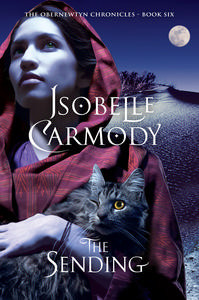 I did reedit them with the American publisher Random House. In a way it is a nightmarish thing to contemplate, but in the case of the first book, I was quite happy to be able to tidy a couple of the mistakes made by my younger self. But as a rule, I am not in favor of it. I think it takes a saint to do it well- Nadia Wheatley went back and rewrote The House that as Eureka because some new information had come to light, historically speaking, and she wanted to correct her work. But of course she is an historian as well as a writer and a real perfectionist as well as a true idealist. But my stories are all about internal worlds, really. The inside turned so that it is outside. The invisible made visible. The intangible made tangible.
I did reedit them with the American publisher Random House. In a way it is a nightmarish thing to contemplate, but in the case of the first book, I was quite happy to be able to tidy a couple of the mistakes made by my younger self. But as a rule, I am not in favor of it. I think it takes a saint to do it well- Nadia Wheatley went back and rewrote The House that as Eureka because some new information had come to light, historically speaking, and she wanted to correct her work. But of course she is an historian as well as a writer and a real perfectionist as well as a true idealist. But my stories are all about internal worlds, really. The inside turned so that it is outside. The invisible made visible. The intangible made tangible.
Q: I notice in the Penguin Presents interview (see below) there are original artworks on the walls of your home on the Great Ocean Road. They look like you commissioned them. Who painted them? Is one of your brothers or sisters an artist? Did you paint them? They are really lovely!
[youtube=http://www.youtube.com/watch?v=FsKZow5ZBSE]
The paintings are mostly by Anne Spudvilas, who is a fine artist as well as a children’s book Illustrator. In fact I knew her as a fine artist first and brought work from her in that incarnation. She did her first ever work as an illustrator for Penguin for the cover of The Gathering. She also did the wonderful picture of my daughter and I. I love her work. I love how she uses green in flesh. I also have some wonderful aquatints by Rachel Litherland who is the daughter of the British poet Jacquie Litherland – in fact I first saw her work in one of her mothers’ poetry collections. I also have a few by Jiri Novak, who is also a fine artist as well as an illustrator.
Q: You mention that your husband is a jazz saxophonist. My daughter is a jazz vocalist and has studied at the QLD conservatorium. I’ve heard that jazz musicians require a different type of mind from classical musicians because jazz is more free form. It’s a bit like writing a book, you have to trust your instincts. Do you find even though your husband is a musician and you are a writer, that the creative source in both of you is similar?
 He is a writer, too. By that I mean he writes poetry – he is known as a cubist poet – and he is a very well known poetry critic here. He actually won the FX Chalda prize for criticism last year. His medal looks a lot like my Book of the year Medal. But he makes a living as a Jazz pianist. He loves modern jazz but spent a lot of years doing traditional jazz as well. I always think of his as a musician with the mind of a writer, if that makes any sense. His writing is High Art and mine is story telling. But it is lovely to have someone enjoy words as much as I do.
He is a writer, too. By that I mean he writes poetry – he is known as a cubist poet – and he is a very well known poetry critic here. He actually won the FX Chalda prize for criticism last year. His medal looks a lot like my Book of the year Medal. But he makes a living as a Jazz pianist. He loves modern jazz but spent a lot of years doing traditional jazz as well. I always think of his as a musician with the mind of a writer, if that makes any sense. His writing is High Art and mine is story telling. But it is lovely to have someone enjoy words as much as I do.
Q: I was prompted to start this series of interviews because there seems to be a perception in the US and the UK that fantasy is a bit of a boy’s club. Do you think there’s a difference in the way males and females write fantasy?
 Hmm I am not sure. I was tempted to say yes but I don’t really know. I like Charles de Lint and Guy Gavriel Kay and I love the late David Gemmell’s writing- they are all very different, and I love Sheri Tepper and Robin Hobb … and they are different too. No. Maybe what I think is that there is a difference between male and female writers of bad fantasy which tends to rely too heavily on stereotypes, and therefore is itself more likely to fall into being stereotypical.
Hmm I am not sure. I was tempted to say yes but I don’t really know. I like Charles de Lint and Guy Gavriel Kay and I love the late David Gemmell’s writing- they are all very different, and I love Sheri Tepper and Robin Hobb … and they are different too. No. Maybe what I think is that there is a difference between male and female writers of bad fantasy which tends to rely too heavily on stereotypes, and therefore is itself more likely to fall into being stereotypical.
Q: Following on from that, does the gender of the writer change your expectations when you pick up their book?
No. Either I like the character and get into the book, or I don’t. A great writer can make even the most peculiar character a door you want to enter- look at China Mieville in Perdido St station! A female character with a female bottom half and the head of an ant, who makes art with spit, and you really like her.
Q: And here’s the fun question. If you could book a trip on a time machine, where and when would you go, and why?
I’d go back and talk to my dad and my brother, who died ten years apart on the same road in car accidents. I’d like to tell them what happened to us all, and talk over things. I’d like to say sorry to my brother, whom I was quarrelling with when he died… I’d also like to talk to Martin Luthor King and Sapho.
Follow Isobelle on Twitter ISOBELLE CARMODY @FIRECATz
Listen to Isobelle talk about her love of writing and what it’s like to live between Australia and Prague.
Listen to an interview with Isobelle by Louise Maher.
Catch up with Isobelle on GoodReads
Catch up with Isobelle on Facebook

